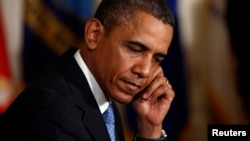U.S. President Barack Obama reportedly is considering supplying weapons to the Syrian opposition, a move the United States has resisted because of fears the arms could end up in the hands of al-Qaida-linked Islamist militants fighting alongside rebel forces.
Senior White House officials say the president has not yet made a decision, but has asked his national security team to identify ways the United States can increase its assistance. So far, that aid has been limited to non-lethal support.
In Syria Wednesday, activists reported several rockets fell on a Damascus neighborhood, a day after a wave of insurgency-related violence hit the Syrian capital and a northern border crossing into Turkey.
It is not clear what U.S. equipment is under consideration for the Syrian rebels, who have requested antitank weapons and surface-to-air missiles.
Suppling weapons would bring the U.S. in line with Arab countries like Saudi Arabia and Qatar, which are already arming the rebels, and with Britain and France, which want to lift an EU arms embargo on Syria to aid insurgents seeking to topple President Bashar al-Assad.
While U.S. aid for the opposition "has been on an upward trajectory," officials say efforts are still being explored to achieve a political solution to the Syrian crisis, which has stretched on for more than two years.
President Obama said Tuesday he needs more facts about chemical weapons use in Syria before committing to stronger action against Assad's government.
Obama has called the use of chemical weapons in Syria a "game changer," but refused to give details on what options he would consider.
In a letter to the U.S. president Tuesday, the commander of the rebel Free Syrian Army complained that "Assad is not taking your carefully phrased condemnations as warnings, but as loopholes," which justify the continued "small-scale" use of chemical weapons.
General Salim Idriss underlined his plea for U.S. military assistance, saying the FSA under his command has "neither the training nor the equipment to counter the effects of Assad's chemical weapons or to destroy them."
He also said weapons of mass destruction would "not be welcome" in a "future, free Syria."
Last week, the White House told lawmakers it believes "with varying degrees of confidence" that the Assad government has used sarin gas against rebels. Britain and France have asserted that such evidence exists.
United Nations Secretary-General Ban Ki-moon is urging Syria to allow an immediate and unconditional investigation into the allegations.
Syria's U.N. Ambassador Bashar Ja'afari denied his government has used chemical weapons, instead accusing rebels of using them.
Senior White House officials say the president has not yet made a decision, but has asked his national security team to identify ways the United States can increase its assistance. So far, that aid has been limited to non-lethal support.
In Syria Wednesday, activists reported several rockets fell on a Damascus neighborhood, a day after a wave of insurgency-related violence hit the Syrian capital and a northern border crossing into Turkey.
It is not clear what U.S. equipment is under consideration for the Syrian rebels, who have requested antitank weapons and surface-to-air missiles.
Suppling weapons would bring the U.S. in line with Arab countries like Saudi Arabia and Qatar, which are already arming the rebels, and with Britain and France, which want to lift an EU arms embargo on Syria to aid insurgents seeking to topple President Bashar al-Assad.
While U.S. aid for the opposition "has been on an upward trajectory," officials say efforts are still being explored to achieve a political solution to the Syrian crisis, which has stretched on for more than two years.
President Obama said Tuesday he needs more facts about chemical weapons use in Syria before committing to stronger action against Assad's government.
Obama has called the use of chemical weapons in Syria a "game changer," but refused to give details on what options he would consider.
In a letter to the U.S. president Tuesday, the commander of the rebel Free Syrian Army complained that "Assad is not taking your carefully phrased condemnations as warnings, but as loopholes," which justify the continued "small-scale" use of chemical weapons.
General Salim Idriss underlined his plea for U.S. military assistance, saying the FSA under his command has "neither the training nor the equipment to counter the effects of Assad's chemical weapons or to destroy them."
He also said weapons of mass destruction would "not be welcome" in a "future, free Syria."
Last week, the White House told lawmakers it believes "with varying degrees of confidence" that the Assad government has used sarin gas against rebels. Britain and France have asserted that such evidence exists.
United Nations Secretary-General Ban Ki-moon is urging Syria to allow an immediate and unconditional investigation into the allegations.
Syria's U.N. Ambassador Bashar Ja'afari denied his government has used chemical weapons, instead accusing rebels of using them.






